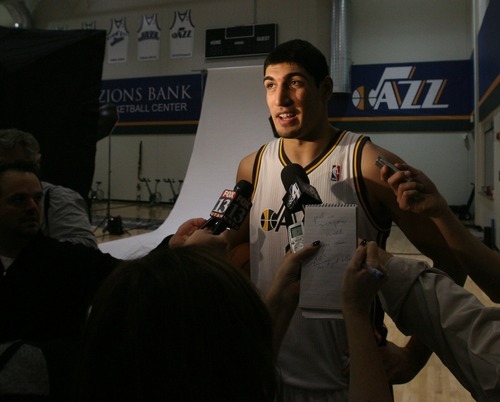This is an archived article that was published on sltrib.com in 2011, and information in the article may be outdated. It is provided only for personal research purposes and may not be reprinted.
Enes Kanter waited his entire life for a single moment.
As a child growing up in Turkey, the future No. 3 overall pick of the 2011 draft dreamed of wearing an NBA uniform and having the opportunity to compete against some of the best athletes in the world on a daily basis.
Friday, Kanter's lifelong dream finally became reality. He signed his first big NBA contract, put on a crisp new Jazz uniform, and ran across the hardwood during Utah's initial practice for the upcoming 2011-12 season.
The 161-day NBA lockout was over. Kanter's chance had arrived. And what had started to feel like a lifetime's worth of basketball solitude was erased as soon as coach Tyrone Corbin started barking out commands.
"I was really nervous and excited when I first started playing basketball. That was my dream, [playing in the NBA], and today it just happened," said the 6-foot-11, 259-pound center during media day at the team practice facility.
Kanter called his family in Turkey as soon as he signed the deal, instantly erasing years of frustration that peaked with his failed attempt to play college ball at Kentucky.
The drama was gone, the wait was over. Now, the international mystery man just has to prove he can truly play center in the NBA.
"I'm just not scared," Kanter said. "I'm just going to go on the court and do my best and try to help my teammates."
The rookie big man was surrounded by his new teammates Friday, with everyone from Al Jefferson and Paul Millsap to a newly signed Earl Watson and a 100 percent healthy Mehmet Okur flashing smiles and answering questions.
Jefferson openly discussed his improved conditioning and renewed athletic focus, proudly recounting his time spent during the offseason at a high-performance training facility in Santa Barbara, Calif.
"I worked real hard, man. Now it's just time to show it on the court," said Jefferson, who acknowledged he slowly wore down while playing all 82 games last season, despite averaging team-highs with 18.6 points and 9.7 rebounds.
Jefferson refused to discuss his personal life — specifically a domestic assault incident late Thursday with his live-in girlfriend.
"It's a personal matter and I'm done talking about it. I want to discuss basketball," Jefferson said.
And with that, talk returned to the roundball.
Second-year small forward Gordon Hayward appeared as confident as he did toward the end of 2010-11, when he averaged 16.4 points during an impressive seven-game run in April, and ended the year with a season-high 34-point outburst against Denver at EnergySolutions Arena.
Hayward's ballhandling has improved; he added about 15 pounds of muscle weight while working out in Indianapolis; and he's open to either playing the 2 or 3 this season.
He's still a fresh-faced 21-year-old. But the No. 9 overall pick from 2010 is now more associated with the Jazz than Butler, and he said one year of NBA experience goes a very long way.
"You just take the good from last year and build on it and take the bad and learn from it. Hopefully be a lot more consistent," said Hayward, who acknowledged he'd like to start but understands it's Corbin's decision to make.
Consistency has long plagued small forward C.J. Miles. However, the slimmed-down sixth-year pro finally looked more like a veteran than a kid. As confident as ever after posting career numbers last season, Miles acknowledged he's entering a new era at the same time a rebuilding Utah franchise does.
Miles can no longer just be a laid-back jokester and rely on his raw talent and smooth stroke to save him. Like many Jazzmen, Miles must perform at a consistent, premier level for Utah to have a realistic chance of taking a step forward. And after watching the only NBA team he's ever known fracture and fall apart during 2010-11, Miles knows the high road is the only way to go.
Facing uncertainty and low expectations, the Jazz have to stick together, Miles said. Learning Corbin's slightly revamped system, adapting to new rotations and roles, and persevering through a hectic 66-game schedule are obvious hurdles. But team chemistry and trust will surmount them all.
"That's the biggest thing we're going to have to do, especially with the youth and everything that's so new. … We can't crack on each other," Miles said.
He added: "We can't break down and go at somebody or break down as a team and say, 'Oh, I'm going to do it myself.' We've just got to stick together as a team. That's the biggest thing that'll keep us through thick and thin."
Twitter: @tribjazz
facebook.com/tribjazz



